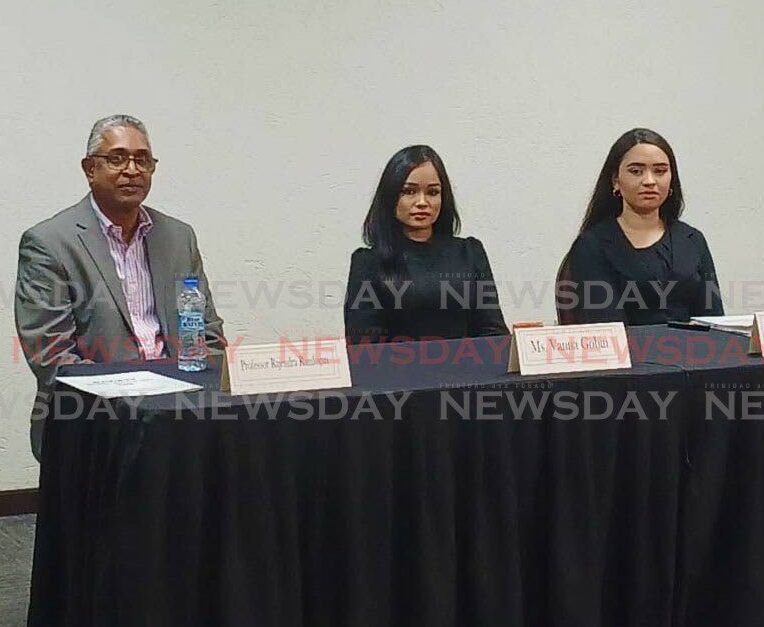Chairman: Integrity Commission needs more resources

Chairman of the Integrity Commission Prof Rajendra Ramlogan has said since the commission's inception in 1987 it has failed to prosecute anyone owing to lack of legislation.
Speaking on Friday at its anti-corruption day, titled All Hands on Deck, at Columbus Circle, Westmoorings, Ramlogan spoke of challenges faced in combating corruption.
He began by acknowledging the serious nature of corruption and the public's awareness of the crime situation. He emphasised the need for a collective effort to address corruption and outlined the commission's efforts during its 17th term, which started in January 2021 and is set to end soon.
He addressed public criticism and the need for a comprehensive understanding of ground-level processes. He said the commission was focused on accountability, timeliness and performance.
Ramlogan said financial constraints were a major hurdle, with a staff reduced from 63 to 26 and limited funds, making it challenging to carry out investigations effectively. He also spoke of difficulties in accessing special funds and the impact on serving court orders and enforcing the law.
He called the filing of declarations a significant issue, saying people in public life were not co-operative. He said over 3,000 declarations from 2014-19 were outstanding when he assumed office in 2021 and the commission adopted a zero-tolerance approach, resulting in court orders for non-compliance.
Ramlogan discussed the transparency of the commission regarding funds and the struggle to balance the budget. He also spoke of the importance of compliance to address gaps in income and assets declared.
The chairman also provided insights into the examination of declarations, saying a large number remained unexamined until recently. Ramlogan said the commission, despite its resource constraints, worked diligently to examine a significant number of declarations in a short period of time.
Addressing investigations, Ramlogan discussed inherited cases, challenges with evidence dating back to 2010 and the commission's efforts to close files within statutory time lines. He called for a streamlined process and digital transformation, expressing frustration over limited funding for digitisation.
Ramlogan touched on the autonomy of the commission as outlined in the governing act and the challenges posed by short-term contracts for staff. He called for proper funding and transparency in financial allocations.
Vanna Gobin, the commission's compliance administrator, spoke of the commission's achievements against corruption. She said it had recorded an unprecedented 33 per cent voluntary compliance rate by the March 31 deadline, marking a historic milestone. Gobin said such a level of compliance had never been seen before, signalling a positive response to the commission's zero-tolerance approach to non-filing.
As of December, the commission has already achieved a voluntary compliance rate of 65 per cent, setting another record high for the past six years. Gobin expressed satisfaction that the zero-tolerance approach to non-filing resonated with people.
Gobin acknowledged challenges in the anti-corruption landscape, saying despite various legislative frameworks, including the Integrity and Public Life Act, the Prevention of Corruption Act, and the Public Property and Disposal of Public Property Act, corruption remains rampant.
The Corruption Perception Index of 2022 ranked TT at number 77 out of 180 countries, citing issues such as the illicit drug trade as a major contributor to the country's high corruption ranking.
She spoke of a report from the US in 2022, identifying official complicity and a lack of justice, as fuelling corruption. The report said despite stringent legislation and penalties for corruption, there was a critical issue in the lack of effective enforcement. It said corruption permeated various levels of government, contributing to the country's challenges in combating corruption effectively.
Jessi Geoffroy, the commission's investigations administrator, said it was committed to revolutionising integrity and ensuring all relevant parties played their part in the anti-corruption efforts.
He said the commission had used its powers to get individuals to provide documents and information essential for investigations.
Geoffroy said there were challenges in the efficiency of summoning witnesses, with instances of non-attendance affecting the investigative process. She said mechanisms needed to be developed to improve on that.
She said the commission had filed its first application seeking a court order to compel compliance from a state entity that had failed to provide crucial information requested for an investigation, demonstrating its commitment to pursuing justice and anti-corruption measures.

Comments
"Chairman: Integrity Commission needs more resources"